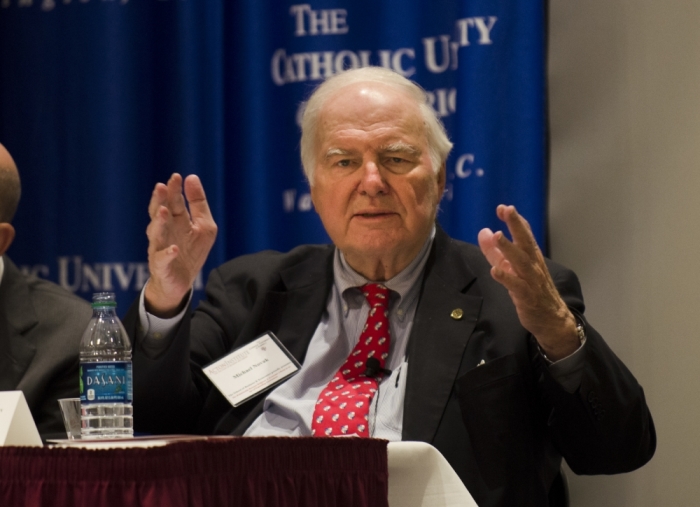Michael Novak, Catholic Scholar Who Made Moral Case for Capitalism, Dies at 83

Catholic philosopher Michael Novak, who made the moral case for a free-market economy, passed away Friday at his home in Washington at the age of 83. He is being remembered by Christian leaders and groups for his devotion to Christ and for his courage and gentleness.
"We knew it was coming. Still, it is a painful blow," wrote Robert P. George, the McCormick Professor of Jurisprudence at Princeton University, in a Facebook post, about the death of Novak, who argued that free-market economy can help defeat poverty and encourage human creativity.
Novak's 1982 book The Spirit of Democratic Capitalism identified the benefits of capitalism, and was awarded the Templeton Prize for Progress in Religion in 1994. He served as ambassador to the U.N. Commission on Human Rights in 1981 and 1982.
"He was notable not only for his brilliance and devotion to Christ and his Church, but also for a rare combination of virtues: courage and gentleness," added George, one of the country's leading conservative intellectuals. "He was a mentor to many and a loyal and generous friend to anyone who would accept the hand he never failed to extend. Some, alas, because of his defection from the left to neo-conservatism, would not, or would no longer, accept his hand in friendship."
Russell Moore, president of the Ethics & Religious Liberty Commission of the Southern Baptist Convention, tweeted, "Michael Novak was a great man. He took the time to share encouragement and wisdom with me. I am sorry to hear of his death."
Arthur Brooks, president of the American Enterprise Institute, issued a statement, recalling that Novak was an AEI scholar for three decades until his retirement in 2010, and "remained a close friend of the Institute."
Novak convened "one of the most consequential policy seminars in AEI's history," Brooks added. "In the mid-1980s, he assembled a diverse group of scholars to form the Working Seminar on the Family and American Welfare Policy. Their conclusions were published in 1987 as A New Consensus on Family and Welfare and were presented to President Reagan. It represented the first major policy statement to suggest a work requirement for welfare, and became the foundation of the successful 1996 welfare reform law."
At the time of his passing, Novak was finishing a novel, set around the Johnstown flood in Pennsylvania in 1889.
"His gentle and warm personality made him a beloved figure at the Institute," Brooks said.
Novak was also a faculty member of Catholic University of America.
"Unlike some scholars, Michael Novak made it a point to reflect on new and different topics, always with a fresh and dynamic perspective," CUA President John Garvey said in statement. "We are immensely grateful that he could end his academic life as he began it, as a member of our community."
In November 2014, Novak spoke at an Acton Institute conference hosted by the Catholic University of America. "Years ago," he said, he would argue with some of the U.S. Catholic bishops that they should stop supporting so many programs that give greater control to the government because that control could later be used against them. Citing the recent examples of the government infringing upon the freedom of Catholic charities and adoption agencies, he remarked that "the Democratic Party owned the Catholic Church in America, at least at the U.S. bishops headquarters," but the bishops "didn't stop to think, if you give the government the power to do all these programs," the government "can tell [Catholic organizations] what to do."




























